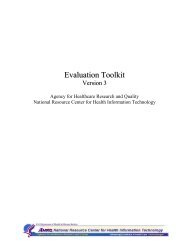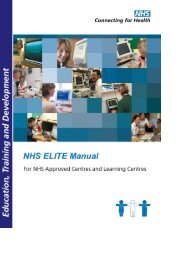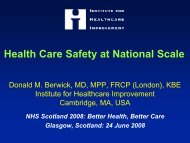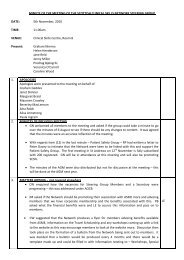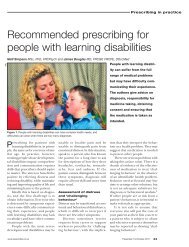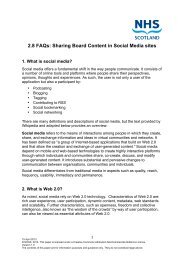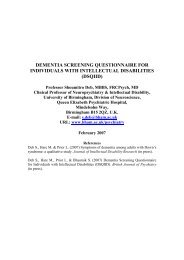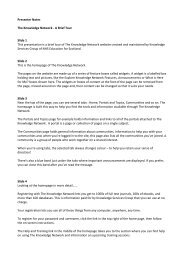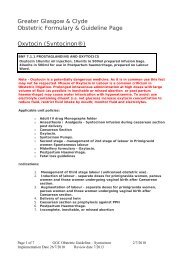The Fife Dementia Strategy: 2010 â 2020 - The Knowledge Network
The Fife Dementia Strategy: 2010 â 2020 - The Knowledge Network
The Fife Dementia Strategy: 2010 â 2020 - The Knowledge Network
You also want an ePaper? Increase the reach of your titles
YUMPU automatically turns print PDFs into web optimized ePapers that Google loves.
is referred on to a more appropriate service. <strong>The</strong>re are concerns over these<br />
inconsistent approaches and the impact they have on the service users.<br />
In order to ensure equality in access as well as efficient referral practices, all<br />
intermediate care services in <strong>Fife</strong> must review their referral criteria, ensuring<br />
all relevant service providers are aware of the criteria and why the criteria<br />
exist in the form they do. Where necessary intermediate care services should<br />
re-develop their criteria, ensuring they are clear and implemented consistently<br />
across the service. This will include criteria for use by people with cognitive<br />
impairments such as with people with dementia, and in instances where it is<br />
decided a person will not benefit from the service they will be referred to a<br />
more appropriate service such as a specialist team (see Section 4.10.2). <strong>The</strong><br />
review process has already begun, with <strong>Fife</strong> Council working in partnership<br />
with NHS <strong>Fife</strong> and the Mental Health Collaborative, and with Integrated<br />
Response Teams (generalist intermediate care services) to identify ways of<br />
improved working with people with dementia. Intermediate care services will<br />
be included in the development of the dementia patient pathway as described<br />
in section 4.2.1.<br />
If it is the case that intermediate care services are being provided for people<br />
with dementia then the services need to be structured in an appropriate way<br />
which supports the individual needs of someone with confusion/memory loss.<br />
As many services are currently not targeted at this group providers may not<br />
have received the appropriate level of training. <strong>The</strong> report on generalist<br />
intermediate care services drew attention to this point: “It was highlighted that<br />
the training needs of staff should be considered to ensure team members<br />
were appropriately trained in working with people affected with dementia.” 45<br />
In order to ensure the people with dementia are receiving an intermediate<br />
care service which meets their needs, all generalist intermediate care staff<br />
working with adults and older people must receive dementia specific training.<br />
4.8.2 Develop specialist mental health intermediate care services which<br />
are available across <strong>Fife</strong> and have clear, consistent and well<br />
communicated referral criteria.<br />
<strong>The</strong> options for an older person when they cease (temporarily or permanently)<br />
to be able to live independently at home are often limited due to the speed of<br />
onset of this scenario and a lack of flexibility and responsiveness in current<br />
care services. In many cases the default action for this situation is for an<br />
individual to be admitted to an acute hospital.<br />
As discussed in section 4.11, acute hospitals are a particularly challenging<br />
and stressful environment for people with cognitive or communication<br />
impairments such as those present in many patients with dementia. In general<br />
people with dementia in hospital in general have worse outcomes in terms of<br />
length of stay, institutionalisation and mortality 46 .<br />
45 Gilmour M, Valentine J & McLaren G (2008).<br />
46 Royal College of Psychiatrists (2005). Who Cares Wins: Improving the outcome for older<br />
people admitted to the general hospital. RCPsych, London.<br />
60




